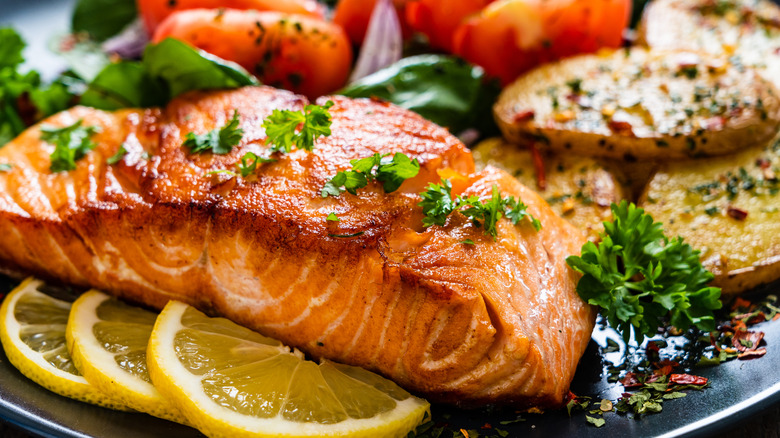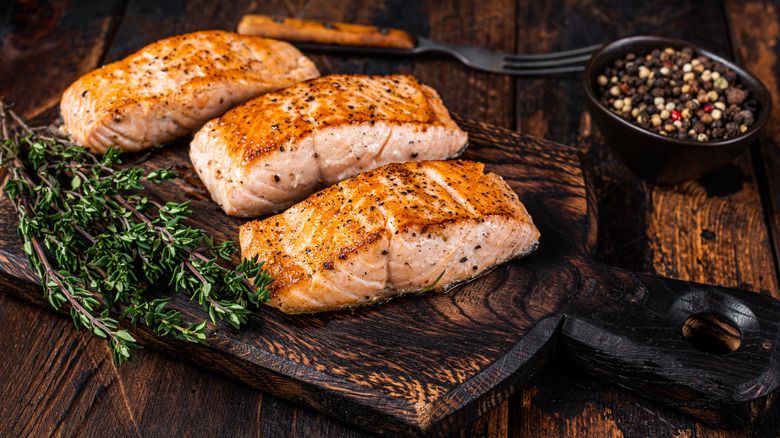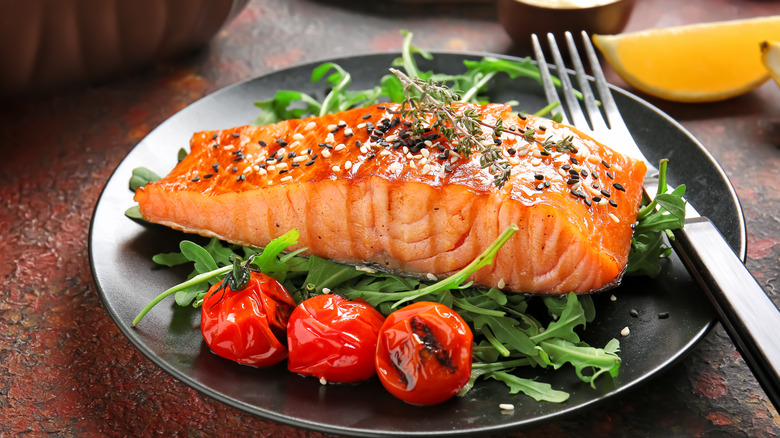Is The Dishwasher Salmon Hack Genius Or Salmonella-Inducing?
We may receive a commission on purchases made from links.
Cooking fish in a dishwasher may sound like a modern hack dreamed up by social media content creators. However, it was actually widely introduced to the American public in 1975 when horror movie star Vincent Price demonstrated the method on "The Tonight Show With Johnny Carson" where he prepared what appeared to be a perfectly flaky fillet of trout.
Since then, plenty of people have opted for using the dishwasher in place of their ovens to make a meal. In fact, Italian food writer Lisa Casali has literally written the book on dishwasher cooking, having published the book "Cucinare in Lavastoviglie" ("Cooking with the Dishwasher"). And food science guru Alton Brown joined the team on the popular show "Mythbusters" to test whether or not a lasagna could be made in the timesaving kitchen appliance, too (spoiler alert: Yes, it can — but don't expect those crispy, crunchy edges). But can you really safely cook salmon amidst the suds meant to destroy the debris on your dirty dishes?
While dishwasher manufacturers may warn against it, the reality is that it is possible. Dishwasher water temperatures range from 120 to 155 degrees Fahrenheit, depending on the cycle. That lowest temperature is just about the same as you might use if you were to cook the salmon sous vide, which means that you could potentially ditch the idea of investing in another fancy appliance and opt for using your handy dishwasher instead.
Tips for cooking salmon in the dishwasher
The most important part of cooking salmon in the dishwasher is ensuring that you wrap each fillet tightly with foil. While you definitely don't want water seeping into your packet of salmon, this is especially important if you're actually washing dishes while your salmon is resting on the rack during the cycle. Suds are certainly not the seasoning that's going to impress your family at supper. If you want to be extra cautious, you can also opt for using an airtight jar for your fillet or vacuum-sealed bags.
Also, avoid using any economical settings on your dishwasher that may be intended to use less heat. Since you're relying on the dishwasher to cook the salmon, any heat conservation will be counterproductive to your goal of achieving perfectly poached-style results.
Finally, be sure to prep your salmon just like you would if you were using a more typical cooking technique. From drizzling it with oil or lemon juice to seasoning it with spices, whatever your preferred method for making your salmon flavorful is, do the same. One caveat is that while slathering the fillet with mayonnaise may be ideal when oven-baking, it may not work as well with the dishwasher method. Instead, save the creamy condiment to make a topping for after cooking, like an herbed aioli or a simple tzatziki sauce.
Why cook in the dishwasher?
Just because you can cook salmon or other foods in the dishwasher doesn't necessarily mean that you should. After all, the oven and stovetop have been perfectly serviceable for years and have predictable temperatures. But, advocates of dishwasher cooking point to a few advantages of whipping up meals while simultaneously washing the dishes.
The most obvious reason to heat your meats and veggies in the dishwasher is efficiency. After all, who doesn't like the idea of finishing a meal without the hassle of rinsing pots and pans afterward? Not only are you avoiding dirtying dishes, but the ones that previously needed to be cleaned are ready to be put away. Plus, popping your packet of food in the dishwasher means no standing over the stove, freeing up time to tend to other tasks.
Furthermore, if you're looking for a way to have a hot meal when the weather is warm, it's the perfect way to avoid heating up your kitchen. Plus, you can save cash by powering only the dishwasher rather than multiple appliances — just make sure you temp your fish to check it's cooked through.
A final bonus, particularly when it comes to fishy dishes, is that it eliminates unpleasant lingering odors in the air after cooking. In fact, if you toss a lemon on the top rack of your dishwasher before you run it, you might just wind up with a fresher-smelling kitchen after the cycle.



